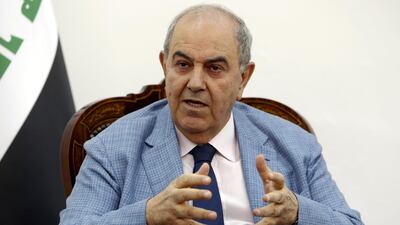Iraq’s vice president, Ayad Allawi says it was the mistakes of the past administration that have led the country to the crises it faces today.
“The Kurdish referendum for independence from Baghdad’s central government is without doubt the result of errors in Iraq’s previous administration. We have voiced our concerns about those and warned of its repercussions,” Mr Allawi told the National.
“We mustn’t forget the tension that affected Baghdad and Erbil’s relationship and contributed to the exacerbation of the situation that we see today.”
He was referring to the administration led by Nouri Al Maliki, Iraq’s former prime minister, who is seen as a close ally of Iran. He is also generally held to be responsible for the fall of Mosul and the disintegration of Iraqi security forces who offered little or no resistance as the extremists swept in, and is considered to have damaged relations between Baghdad and Kurdistan’s regional government by cutting the budget for the Kurdish region.
“We believe that the partisan and sectarian systems of that [Nouri Al Maliki] administration are the main causes of what has happened and is currently occurring in Iraq,” Mr Allawi said. "Its continuation will have serious implications for the future of Iraq.”
In the 2010 elections, Mr Allawi’s National Coalition Accord won two more seats than Mr Al Maliki, his fiercest competitor, but fell short of a majority.
“During my last trip to Erbil, [Kurdish president] Masoud Barzani said that if Ayad Allawi had been the prime minister of Iraq [instead of Mr Al Maliki] the referendum would have never happened and we would not be where we are today,” Mr Allawi said.
The referendum on independence angered both the central government in Baghdad and was opposed by the international community.But one of the main reasons it happened was Mr Al Maliki cutting Erbil’s budget in 2014 over a dispute on oil sharing. This, said Mr Barzani, “deepened the Kurds' desire for independence from Iraq.”
Born in 1945, Mr Allawi, a secular Shiite Arab from a prominent family, became the first Iraqi prime minister after the US-led invasion of 2003. He led a coalition government broadly committed to a secular future for Iraq.
"The outcome of recent developments in the Kurdistan region of Iraq are a dangerous precedent that threatens the security, unity and stability of Iraq,” he said. "Iraq is at a critical juncture where it could fall deeper into crisis unless it adopts wisdom through dialogue. I hope Erbil and Baghdad can develop dialogue as a way to resolve their outstanding issues. Dialogue is needed to deal with and avoid discrimination, economic reforms and dictatorship.”
Mr Allawi advised the Kurdish authorities to “refrain from escalating tensions, imprudence and military threats”, and urged the central government in Baghdad and the security forces to "fully restrain from any action that undermines civil rights, and reject any interference. Military assaults should be solely against ISIL and the forces of terrorism,” he said.
The issue of Kirkuk, the oil-rich but disputed city
The ethnically-mixed city of Kirkuk is one of a number of areas that lie outside the autonomous Kurdish region but are controlled by Kurdish forces and claimed by both Erbil and Baghdad.
“The issue of Kirkuk and all disputed areas must be addressed in such a way that cements national participation, engages all social groups and their interests, quelling all tensions,” the vice-president said. Parliament must also address laws on oil and gas that have been left unattended for more than 10 years.
“We need to implement measures and legislation that promote mutual trust between all sides and consolidate the concept of national partnership and eliminate anything that ignites conflict.”
Mr Allawi was most emphatic that legislation must be passed to abolish all forms of sectarianism, stressing that laws that are deemed unconstitutional must be amended and based on civil liberties, state-building and citizenship.
Rise of ISIL in Iraq
Mr Allawi believes ISIL was able to establish itself in Iraq because the country was not united in 2014. "The political environment was such that many felt excluded and marginalised, and it was the people who suffered for it because their rights were overlooked."
The political settlement for a post-ISIL Iraq is just as important as the fight against ISIL, he said. "The lack of planning by government was evident in the operation on Mosul. They neither respected the humanitarian aspect nor handled it well. Nor did they look beyond the military at the political horizon, on what was to happen after ISIL. That wasn't even considered."
Mr Allawi warned that the region as a whole could be affected by the twin problems of ISIL and KRG's independence. “Iraq’s future will be dark,” he said.
It was Iraqi unity and solidarity that defeated ISIL. "Unity and solidarity will make the strong wall hat will make it possible to confront the problems Iraq will face in the future. Preserving unity in the country will be the tool to tackle Iraq’s crises. That unity is what we are working towards."


